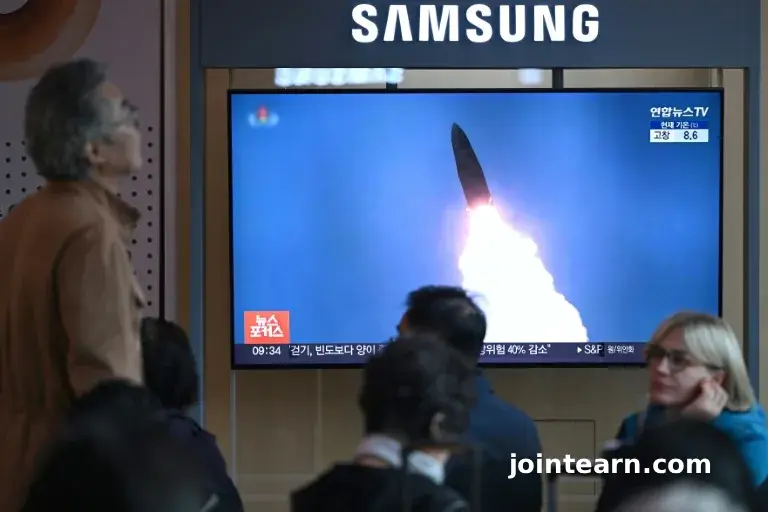
Pyongyang Tests Short-Range Missiles as World Leaders Prepare to Gather in South Korea
North Korea has launched multiple ballistic missiles in its first test in several months, just one week before US President Donald Trump and other world leaders arrive in South Korea for the Asia-Pacific Economic Cooperation (APEC) Forum.
According to Seoul’s Joint Chiefs of Staff, the missiles were fired around 8:10 a.m. local time (2310 GMT Tuesday) from an area south of Pyongyang, traveling approximately 350 kilometers (217 miles) before splashing into the sea.
“We detected several projectiles, believed to be short-range ballistic missiles,” the South Korean military said in a statement, adding that it was closely monitoring for additional launches in coordination with the United States and Japan.
The launch marks North Korea’s first missile test since President Lee Jae-myung took office in June and comes amid rising tensions on the Korean Peninsula.
Timing Raises Diplomatic Stakes Ahead of APEC Summit
The missile launch comes at a highly sensitive moment. President Trump is expected to arrive in Seoul on October 29, where he will meet with regional leaders to discuss trade, security, and North Korea’s nuclear ambitions.
Analysts suggest Pyongyang’s latest show of force is a strategic signal aimed at regaining leverage ahead of potential diplomatic talks with Washington.
“This launch is a direct message to President Trump,” said Park Won-gon, a professor at Ewha Womans University in Seoul. “Kim Jong Un is asserting his presence before an event hosted by South Korea — a move consistent with his past pattern of using missile tests for political messaging.”
North Korea’s Expanding Missile Capabilities
In recent months, North Korea has showcased what it calls its “most powerful” intercontinental ballistic missile (ICBM) — the Hwasong-20 — during a military parade attended by senior officials from Russia and China.
Pyongyang claims the new missile’s strike range “knows no bounds”, further heightening international concern over its growing nuclear capabilities.
In September, North Korean leader Kim Jong Un personally supervised the ninth and final test of a solid-fuel engine intended for long-range missiles, signaling that a full ICBM test launch could occur “in the coming months.”
Experts say the use of solid-fuel technology would allow for faster, more unpredictable launches, making preemptive detection by the United States and South Korea far more difficult.
A Signal to Washington: ‘Recognize Reality’
While the missile tests highlight North Korea’s defiance of UN Security Council sanctions, they also appear designed to set the stage for a possible diplomatic reopening.
Earlier this month, Kim said he still holds “fond memories” of his meetings with Donald Trump, suggesting that future talks remain possible if the United States changes its approach.
“If the United States discards its delusional obsession with denuclearisation and truly wishes for peaceful coexistence with us,” Kim was quoted as saying by state media, “then there is no reason we cannot meet it.”
During his first term, Trump met Kim three times, including historic summits in Singapore (2018) and Hanoi (2019). Talks ultimately collapsed in Hanoi over disagreements on sanctions relief and disarmament commitments.
Regional Reaction: Heightened Security and Diplomatic Uncertainty
Japan’s Prime Minister Fumio Kishida condemned the launches as a violation of UN resolutions, calling them “unacceptable acts of provocation.”
The U.S. Indo-Pacific Command also issued a statement reaffirming that Washington’s commitment to the defense of South Korea and Japan remains ironclad, while urging Pyongyang to “refrain from further destabilizing actions.”
South Korea’s government convened an emergency National Security Council meeting shortly after the launches, vowing to strengthen military readiness and intelligence cooperation with the United States.
Meanwhile, China and Russia, both permanent members of the UN Security Council and allies of North Korea, have urged restraint on all sides, calling for renewed diplomatic dialogue instead of “escalatory measures.”
Background: A Pattern of Strategic Provocations
North Korea has long used missile launches to express political discontent or seek leverage in international negotiations. Analysts say this latest test fits the regime’s pattern of “provocation diplomacy” — combining military displays with offers of conditional dialogue.
“This is classic Kim Jong Un strategy,” said political analyst Cho Sung-ho. “Demonstrate power, then offer talks — but only on his own terms.”
The timing, just days before a major summit involving both Trump and regional leaders, underscores Pyongyang’s intent to remain a central player in regional security discussions.


Leave a Reply